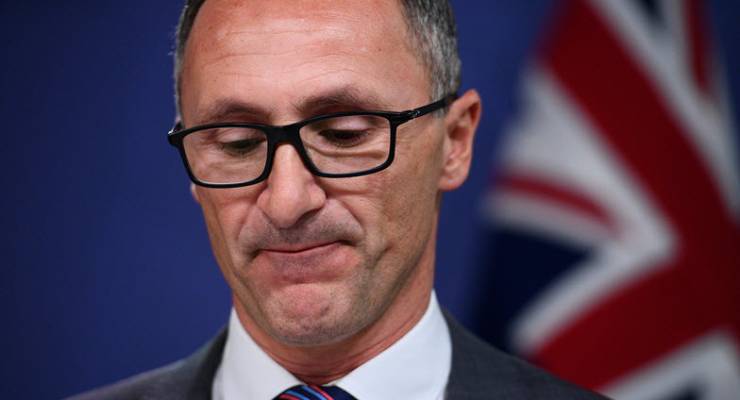
Previously, Crikey has kept an eye on the crises circling the Liberals, Labor and Nationals. However, it is not tokenism that gets the Greens a spot in our series; in many ways, the sense of calamity surrounding them often borders on the existential, and at times makes the other three parties’ crises look positively amateurish.
Alex Bhathal and the ‘bullying’ problem
Crikey has long chronicled the factional dispute that engulfed perpetual candidate Alex Bhathal. At the beginning of last year, as a potential byelection loomed in Batman, a complaint went from the Darebin branch of the Greens to the Victorian state Greens head office calling for Bhathal’s deselection and possible expulsion for alleged bullying and misconduct. More vague and damaging allegations followed, leading party leader Richard Di Natale to concede there was someone in the Darebin Greens who would rather see the party lose than have Bhathal in parliament. It worked: Bhathal suffered a 3.4% swing against her, and Labor held the seat.
Alleging her campaign had been destroyed by sabotage, Bhathal (who had run six times previously) announced she would not run again. And in January this year, she announced she was quitting the Greens altogether, after years of “relentless organisational bullying”.
Sexual misconduct
The Greens are no strangers to a sexual misconduct scandal. The most prominent case has of course been the long-running and acrimonious saga around former NSW Green Jeremy Buckingham.
Buckingham was been accused of inappropriately touching a female colleague in 2011, and then attempting to intimidate her into silence. He denies the allegations, and dismisses them as a “factional smear”. The long public fallout between Buckingham and his colleagues (including Greens federal leader Richard Di Natale) would be bad enough, but it seems to be just the tip of the iceberg. As Holly Brooke reported Crikey as the allegations first began to surface:
The Greens’ institutional response to sexual violence is just one illustration of a dangerous political logic taking hold in the party, one that values electoral success and vote-winning above principle, including the principle of justice for survivors of sexual assault.
The Greens’ unsatisfactory responses to sexual violence has been pointed out elsewhere, by alleged victims and their supporters.
During the the Victorian state election, one candidate (with a fairly questionable social media history) quit on election eve after a rape allegation became public. Before this came the curious case of Footscray candidate Angus McAlpine, whose years-old lyrics performed in his pre-politics career as a rapper — featuring references to date rape and “choking a bitch” — weren’t enough to sink his candidacy. Meanwhile, federal Higgins candidate Jason Ball has faced (and refuted) allegations of sexual misconduct too.
These kinds of allegations and the Greens’ response to them are, in some way, the thread connecting many of the Greens’ troubles; their factional wars, confused messaging and electoral disappointments.
Hemorrhaging membership and factional wars
After the NSW organisation voted that Buckingham should vacate his spot on the party’s upper house ticket, he quit the party (illustrating his disillusionment with the not-at-all hilariously literal step of ripping up a piece of paper with “TOXIC NSW GREENS” written on it). Following that, two candidates for the upcoming state election quit, one blaming the “a small, insidious far-left faction full of vitriol”.
Further, an internal NSW Greens report was leaked, detailing the “significant and worrying” loss of up to 485 party members in the year leading up to November 2018 — a decline of almost 13%.
Loss of representation
The 2018 Victorian state election campaign was a particularly bruising one for the Greens. The history of Greens candidates and staffers kept being dredged to the surface — particularly old examples of extremely weird online humour — to haunt the party. So jokes about shoplifting, drug use, and, um, “greasing oneself up in pig fat and oinking like a grunter at the traffic lights” knocked out candidates and staffers.
A combination of brutal political tactics from their opponents, and the presence of Glenn “preference whisperer” Druery working with micro-parties, meant the Greens were more or less wiped out, losing four of their five seats in the Legislative Council.
Given the rampant disunity and plummeting membership in NSW, the party will be worried about a similar result there in March.
How will the Greens fare at the federal election? Send your thoughts and comments to boss@crikey.com.au.








Crikey is committed to hosting lively discussions. Help us keep the conversation useful, interesting and welcoming. We aim to publish comments quickly in the interest of promoting robust conversation, but we’re a small team and we deploy filters to protect against legal risk. Occasionally your comment may be held up while we review, but we’re working as fast as we can to keep the conversation rolling.
The Crikey comment section is members-only content. Please subscribe to leave a comment.
The Crikey comment section is members-only content. Please login to leave a comment.